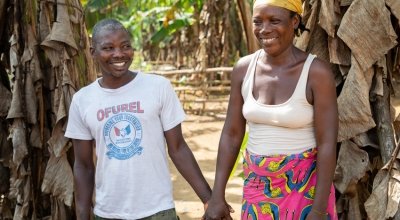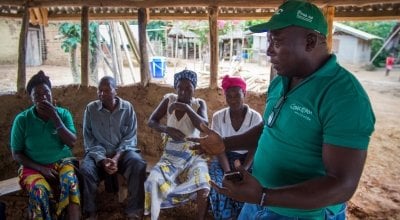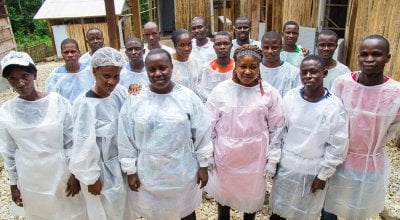
Read our 2023 annual report

Knowledge Hub
Liberia: A classroom in the fields
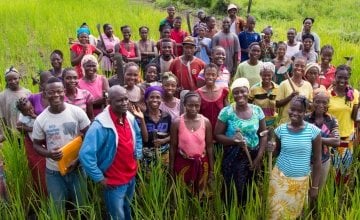
Kieran McConville reports from one of Liberia’s many farmer field schools yielding A+ results for local communities.
Just off a narrow, muddy, rutted road in rural Lofa County, a group of about 50 people are gathered in a large clearing, listening intently to the words of a broad-shouldered man. This is not a religious or political gathering – it is in fact a classroom. Welcome to the local farmer field school.
Sharing knowledge
The man who holds these farmers’ intense attention is Forkpa Blamah, district programme supervisor for Concern in Lofa, Liberia. “We’re aiming to introduce best practices in farming, which will increase yields, while also helping to alleviate malnutrition in the community,” explains Forkpa as the group disperses across the clearing and sets to work. “It’s about sharing knowledge and ultimately improving lives.”
The concept of a farmer field school has been a successful one across many of the countries where Concern works, from Afghanistan to Malawi. Here in Liberia, farmers are formed into groups of about 30 and receive training, advice, seeds and tools. A collective plot is cultivated and sown with a variety of diverse crops using different methodologies. Each group has two facilitators, one male and one female, and they are given intensive training to help them lead the activities.
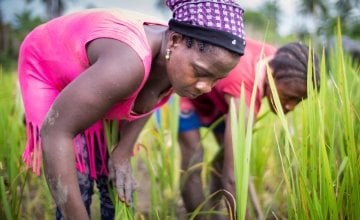
Quiet innovations
“This is the improved method for growing rice,” Forkpa explains, leading us to a large plot planted in neat rows. It doesn’t look especially impressive or radical, but then again the most effective innovations often don’t. “Traditionally, people would use the broadcast method,” he says, “which basically involves flinging fistfuls of seeds across a cultivated area.” However through the field schools, the famers have learnt a new method. Forkpa elaborates:
This way uses less seed in a more targeted way and produces significantly more rice. It’s definitely more labour intensive, but very much worth the effort.
There are three groups in this school and they have planted rice, beans, cowpeas, groundnuts, sweetcorn, cassava and sweet potato. The members get to share the harvest, with any surplus going to a community group. The main purpose is to convince the members to grow these crops and use these methods to increase production on their own farms.
Yield increases
Kebah Bemah is thirty-five years old and is the single mother of five children. Her husband left her and she had to start farming for herself. Kebah heard about the farmer field school from her neighbours and joined it to learn. She has an acre and a half and has seen for herself the effects of what she has learned. Kebah explains:
“With the old method I would get maybe two and a half bags of rice. With this last harvest I got nearly four bags.”
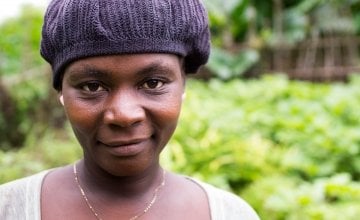
Mixing ashes with potato greens, groundnut and cowpea leaves, and chicken manure creates a powerful fertilizer, which can also help increase yields of other crops. And locally growing plants have proven effective for pest control. We walk from the farm with Kebah back at her home. It takes an hour and when we arrive, Kebah has a surprise for show us. Behind a stout grass fence lies her new kitchen garden, complete with peppers and eggplants, along with local favourites such as Cocoyarn and Beetaball.
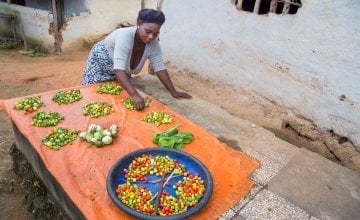
All provide a variety of nutrients, complementing the family diet and help warding off the scourge of child malnutrition, which is so endemic here. “Any extra we have left over we sell,” Kebah says, obviously proud of her newfound productivity.
If you want to see a demonstration of real, effective and sustainable development in action, farmer field schools – and Kebah’s lush kitchen garden – are a good place to start.
Follow us on Instagram
Follow our journey as we work to end extreme poverty, whatever it it takes.



